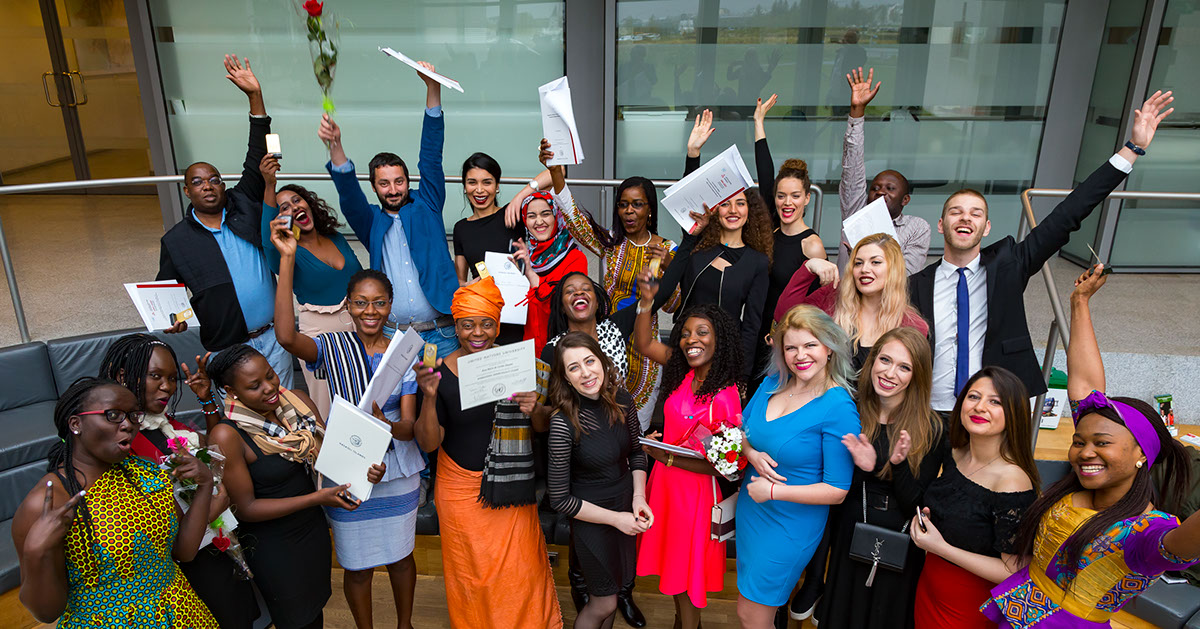The United Nations University Gender Equality Studies and Training Programme (UNU-GEST) celebrated the graduation of 23 fellows who were awarded a post-graduate diploma in international gender studies from the University of Iceland. The fellows come from 14 countries; four men and 19 women from Afghanistan, Burkina Faso, Malawi, Sierra Leone, Mozambique, Palestine, Uganda, Kenya, Lebanon, Tunisia, Nigeria, Bosnia and Herzegovina, Serbia and Montenegro. The graduating class is the largest cohort to graduate from the UNU-GEST programme and the sixth cohort after it became a part of the United Nations University in 2013 as a result of a trilateral agreement between the University of Iceland, the Icelandic Ministry for Foreign Affairs and the UN University (UNU). This cohort included the 100th fellow and in total 109 students have graduated from the programme.
The graduation ceremony was held at the University of Iceland with distinguished guests and speakers. Dr. Irma Erlingsdóttir, Director of UNU-GEST, opened the graduation ceremony and set the scene for the festive occasion. She was followed by Mr. Sturla Sigurjónsson, Permanent Secretary of State, who congratulated the fellows and the UNU-GEST programme on their commitment to gender equality and made the observation that the fellows do not only use the stay in Iceland to learn about gender issues, but also to contribute to Icelandic society in that regard. Mr. Guðmundur Hálfdánarson, Dean of the School of Humanities at the University of Iceland, provided inspiring words for the graduates, thanking them for their contribution towards the University of Iceland and its community during the spring term.
On this festive occasion Erla Hlín Hjálmarsdóttir, Head of Research at UNU-GEST, accounted for the activities of the programme for the past year and Ms. Ammuron Freda Imma from Uganda spoke on behalf of the graduating fellows, shining light on their shared experiences during their stay in Iceland and emphasising a mutual vision as a communal soul towards improved gender equality and better lives for all women. She encouraged her fellows to stay connected and be the guiding light for the change they want to see in the world.
Mrs. Vigdís Finnbogadóttir delivered the award for the best final assignment, named in her honour, the Vigdís Finnbogadóttir Award. Mrs. Finnbogadóttir reflected on the issue by addressing gender equality as a universal, human right and the importance of breaking silences and taboos in this field. She expressed her conviction that the fellows will become leaders of change and role models for gender equality. This year, Ms. Masha Durkalić from Bosnia and Herzegovina received the award for the best final assignment for her research proposal: ‘Feminism Activism in Bosnia Herzegovina, Croatia and Serbia: Political Potentials for Social Change.’ Her supervisor was Dr. Valur Ingimundarson, Professor of History at the University of Iceland.
The objective of UNU-GEST is to promote gender equality and women’s empowerment through research and education. It targets young academics and professionals from developing countries and post-conflict societies working for government and civil society organisations. More than half the fellows were students enrolled in MA degree programmes. Collaborating universities were the Makarere University in Uganda; the Lebanese American University in Beirut, Lebanon; the University of Sarajevo, Bosnia Herzegovina; and Singidunum University in Belgrade, Serbia. In addition, fellows also came from Manouba University in Tunisia and the University of Montenegro. During the semester-long programme the fellows were provided with an interdisciplinary education consisting of six modules delivered by specialists from all over the world to make them more equipped to work on gender issues in their respective countries.
UNU-GEST is located within the School of Humanities at the University of Iceland and is supported by the Ministry for Foreign Affairs as a part of Iceland’s contribution to development cooperation efforts. UNU-GEST is one of the four UNU programmes based in Iceland: UNU Fisheries Training Programme (UNU-FTP), the UNU Geothermal Training Programme (UNU-GTP), and the UNU Land Restoration Training Programme (UNU-LRT).




